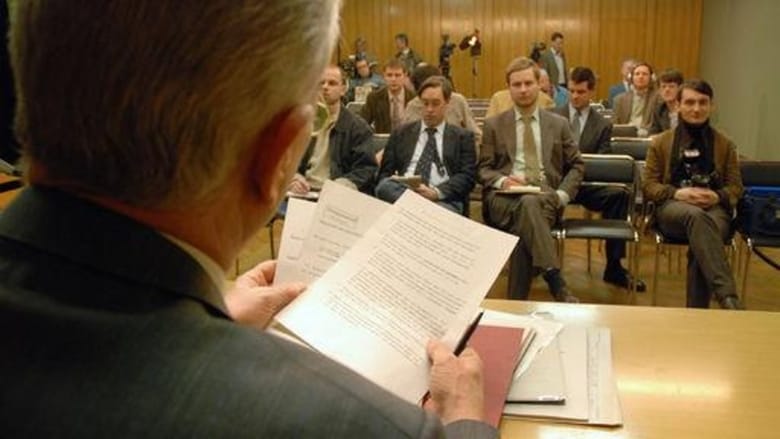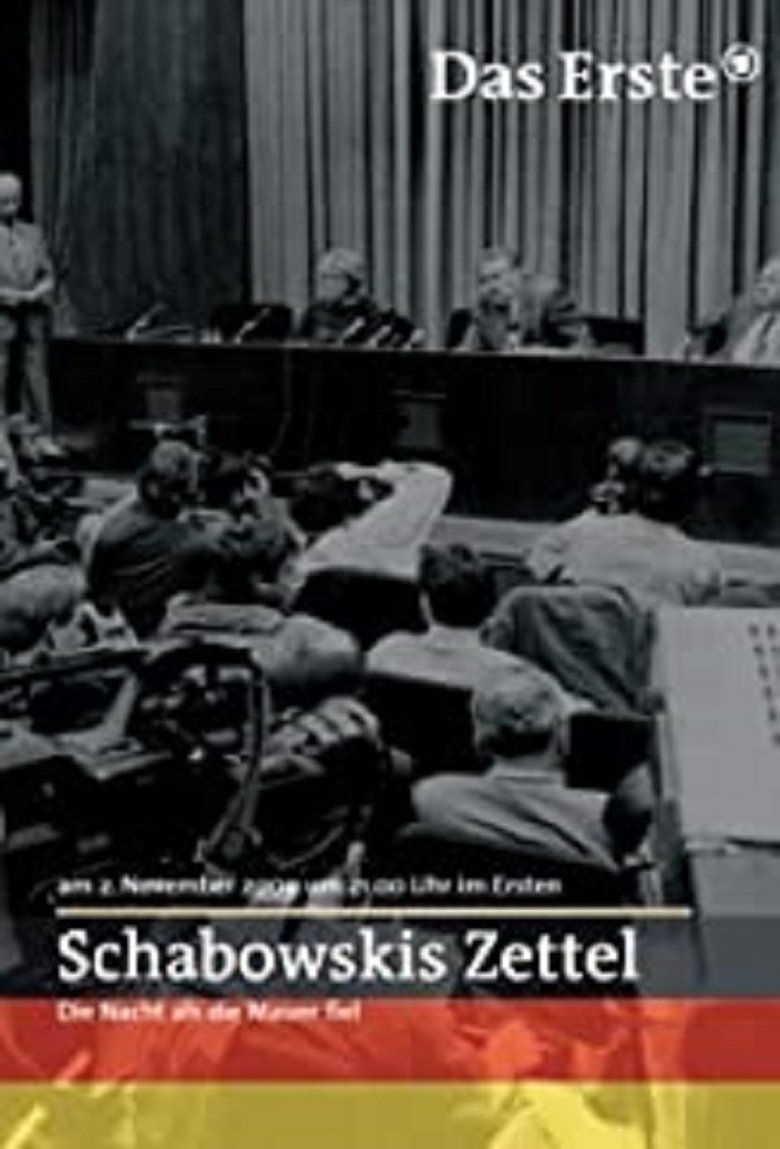Loading


Schabowskis Zettel - Die Nacht, als die Mauer fiel
Genres
Documentary
Overview
Details
Budget
$0
Revenue
$0
Runtime
0 min
Release Date
2009-11-02
Status
Released
Original Language
German
Vote Count
1
Vote Average
7
Cast
Meet the talented actors who bring the movie to life.
Karsten Bähn
Benedikt Sedlmeyer
Richard Bratfisch
Richard Bratfisch
Rita Bratfisch
Rita Bratfisch
Peter Brinkmann
Peter Brinkmann
Tom Brokaw
Tom Brokaw
Peter Helbig
Harald Jäger
Similar Movies
Explore movies similar to this one that you might also enjoy.
7.2
The Red Elvis
A documentary on the late American entertainer Dean Reed, who became a huge star in East Germany after settling there in 1973.
2007-02-13 | de
0.0
Peter Eisenman: Building Germany's Holocaust Memorial
This documentary explores the creation of the Holocaust Memorial in Berlin as designed by architect Peter Eisenman. Reaction of the German public to the completed memorial is also shown.
2009-02-20 | en
8.0
In the Grip of Gazprom
The war in the Ukraine has changed the way many European countries view Russian politics. Suddenly it became clear how dependent countries had become on Russian gas imports for decades and what Vladimir Putin was up to. However, no country needs more gas than Germany. It was only after Russia's invasion of the Ukraine that the German government realized that Russia had long used gas as a weapon to impose its will on states. The instrument created for this purpose is the natural gas production company GAZPROM. So how did Germany become so dependent on Russian gas? The documentary shows how, over several decades and several changes of government, a broad alliance of politicians and business representatives did everything possible to secure Germany's energy supply with cheap Russian gas, while the Kremlin's foreign policy became increasingly aggressive and the warnings of experts went unheeded.
2023-02-07 | de
1.0
Arabic Secret
One who doesn't have roots won't be able to grow wings-a documentary project about a man tracking his origins to the Middle East and establishing a connection with his father, whom he have never met before.
2017-05-31 | pl
8.8
Kraftwerk and the Electronic Revolution
Kraftwerk's vision of a keyboard-driven world of clicking metronomic rhythms and digitised sound bites may have been the stuff of avant fantasy in the 1970s (the decade that saw the band's first groundbreaking albums), but it is a reality in the new millennium. Their visionary style is explored in KRAFTWERK AND THE ELECTRONIC REVOLUTION, a study of the group, their career and their emergence as the most influential electronic band in the world.
2008-09-02 | en
0.0
Schleyer - Eine deutsche Geschichte
2003-07-07 | de
6.6
The Team
Documentary about the victorious German national football team - called "Die Mannschaft" - and their journey to the 2014 FIFA World Cup in Brazil.
2014-11-13 | de
8.0
Last to Know
In the documentary Last To Know political prisoners, sent to jail for openly opposing the East German regime that existed until the German reunification in 1990, talk about their times of trial and their lives today. Neither they, nor their families have come to terms with what happened.
2006-02-11 | de
6.5
The Battle of the Somme
A documentary and propaganda film which shows the British Army's preparations for, and the early stages of, the battle of the Somme.
1916-08-21 | en
5.8
Eldorado
Drawing inspiration from his personal encounter with the Italian refugee child Giovanna during World War II, Markus Imhoof tells how refugees and migrants are treated today: on the Mediterranean Sea, in Lebanon, in Italy, in Germany and in Switzerland.
2018-04-26 | de
6.5
Planet Deutschland - 300 Millionen Jahre
Documentary tells the story of Germany's origins from the Carboniferous period to the present day. It leads from the highest Alpine peaks to the rugged North Sea coasts - from the craters of the Eifel to the river labyrinth of the Spreewald. Back then - around 300 million years ago - giant dragonflies, for example, buzzed through dozens of meter-high fern forests. In the course of the Earth's history, however, we also encounter dying dinosaurs, meet rhinos and elephants on the Rhine and come across what is probably the first human in Heidelberg. Later, the Neanderthals appear and suddenly disappear again - for reasons that are still unknown. And finally, modern humans gradually spread and began to shape their environment.
2014-10-02 | de
0.0
Schwarz, Rot, Gold und Fußballfieber
Documentary about the German football team at the 1990's World Cup in Italy.
2015-07-19 | de
0.0
Kenya’s marathon stars in Europe
For African athletes making money abroad is the big goal. But Kenyan marathon runners need to be careful – the industry is ruthless and only few make it. For years, sports managers have been bringing African athletes to Europe to run in marathons with promises of potential prize money and a top career. For many it’s a means of escaping poverty. But what price do the marathon runners themselves pay? Long-distance running is among the toughest disciplines in the world. Professional marathon runners battle over seconds in a race more than 40km long - seconds that are often worth huge sums of money. Running has become a business. The prize money for a major event can be in five figures. Participants have to be world-class athletes to win these amounts.
| en
4.0
I Am My Own Woman
The life story of Charlotte von Mahlsdorf, who survived the Nazi reign as a trans woman and helped start the German gay liberation movement. Documentary with some dramatized scenes. Two actors play the young and middle aged Charlotte and she plays herself in the later years.
1992-10-30 | de
8.0
White Man with Black Bread
Christof Wackernagel, best known in Germany as an actor and former member of the Red Army Faction ("RAF") lives in Mali. In his compelling portrait, Jonas Grosch shows a man who simply cannot stand still if he senses injustice. The courage to stand up for one’s beliefs coupled with vanity? However one chooses to look at it, it is easy to imagine what made him connect with the "RAF". With his irrepressible will for freedom, Christof Wackernagel gets entangled in the horrors of day-to-day life in Africa.
2007-01-13 | de
0.0
Un jour en Allemagne
With aerial shots filmed from helicopters and drones, moments of life and encounters, this abundant geographical narrative offers a unique perspective on today's Germany, providing an overview of a territory undergoing profound change. Committed to an unprecedented energy transition, Germany has been working for several years to reconcile economic development with respect for nature. This challenge is profoundly transforming its urban and rural landscapes, even though they still bear the traces of a partition that the reunification of a little over a quarter of a century ago has not completely erased.
2016-01-22 | fr
0.0
Die sichere Geburt
This movie charts the three most important questions regarding birth: 1. What makes a safe birth? 2. What disrupts a birth? 3. What do birth interventions mean for mother and baby, how the birth develops and even society at large?
2017-06-11 | de
6.0
Mary Tyler Moore: The 20th Anniversary Show
A retrospective special commemorating the 20th anniversary of the sitcom The Mary Tyler Moore Show.
1991-02-18 | en
6.0
The Pity of War
Professor Niall Ferguson argues that Britain's decision to enter the First World War was a catastrophic error that unleashed an era of totalitarianism and genocide.
2014-02-28 | en
6.8
Germany: A Summer's Fairytale
A documentary of the German national soccer team’s 2006 World Cup experience that changed the face of modern Germany.
2006-10-03 | de